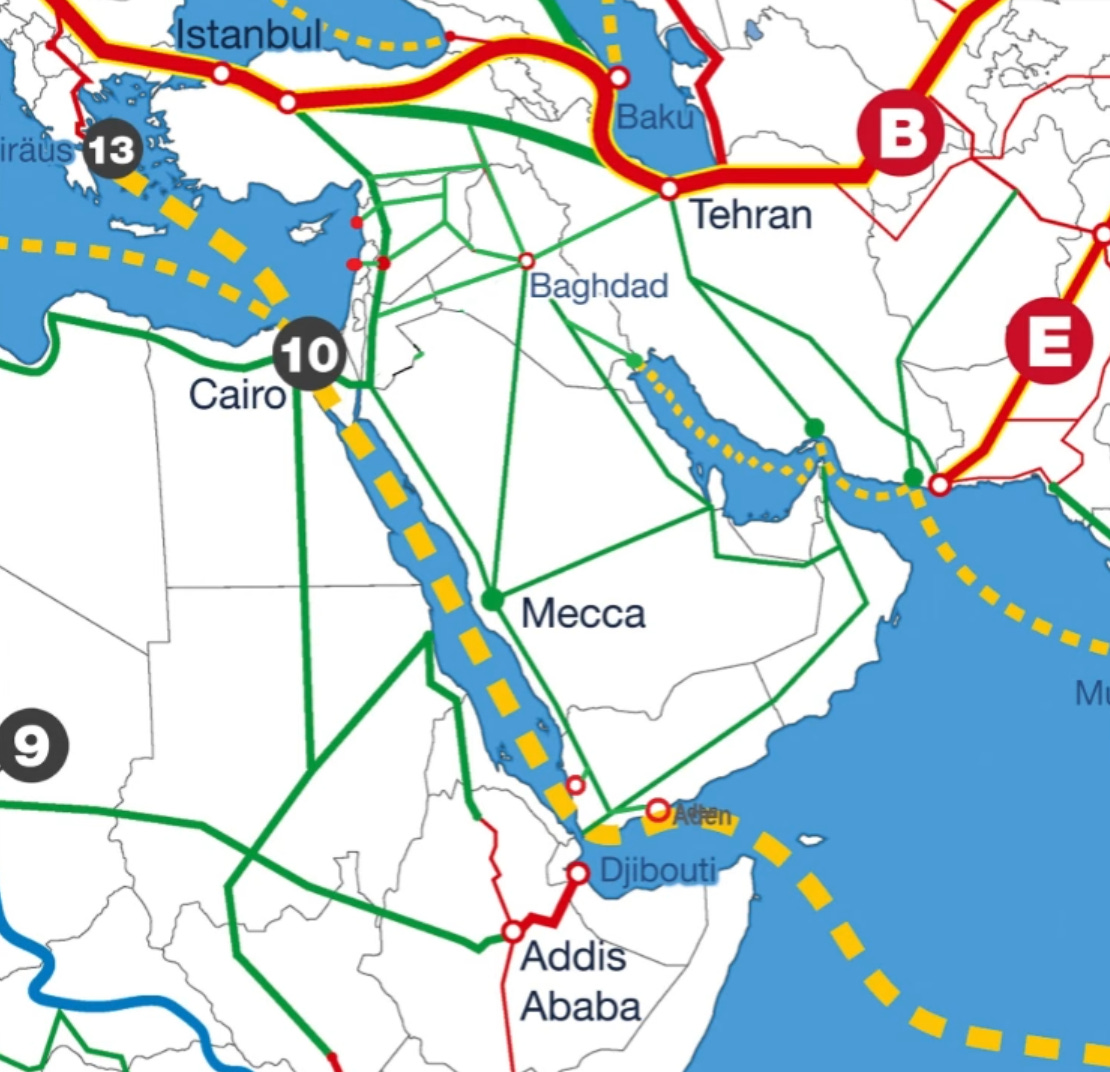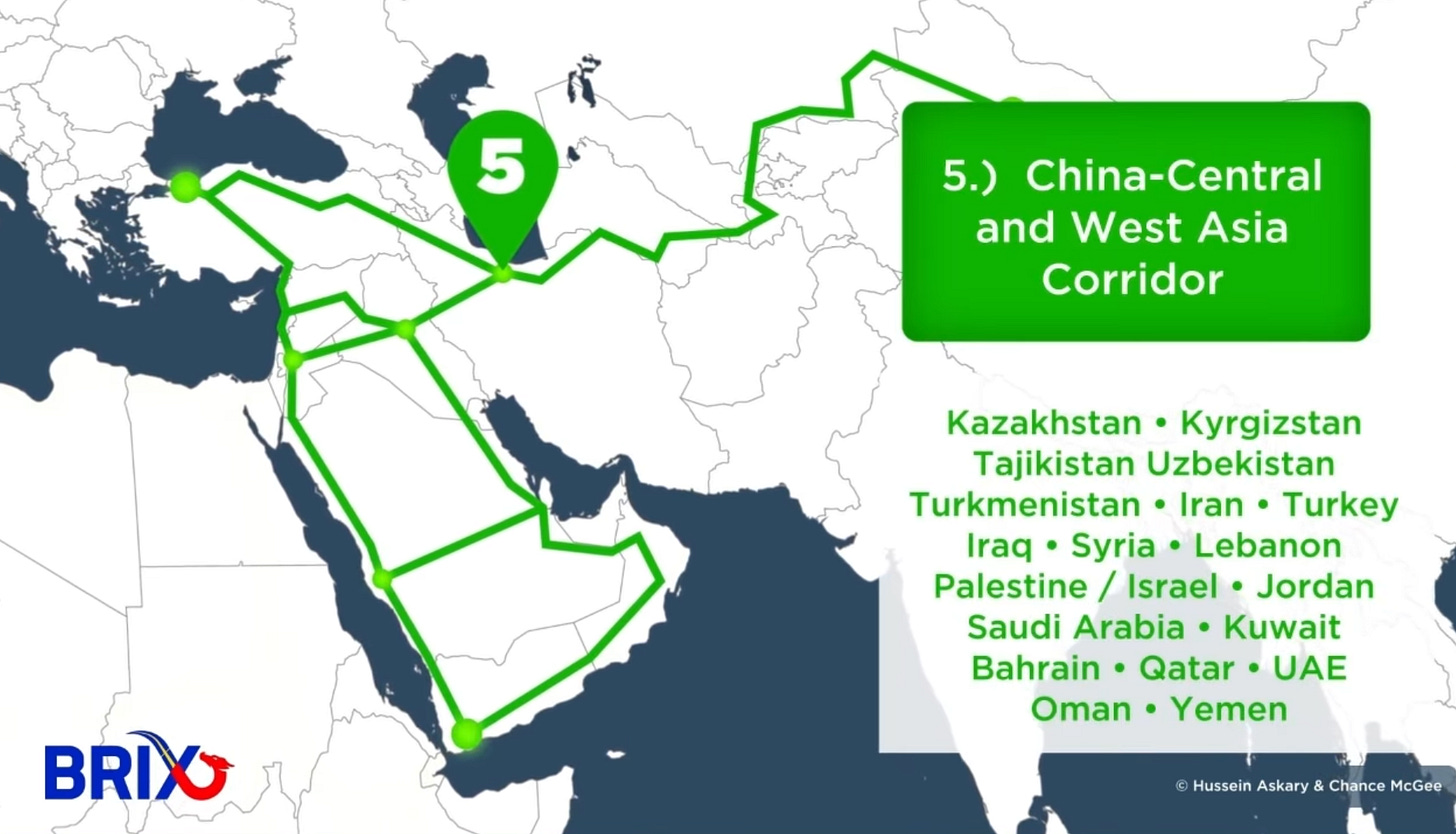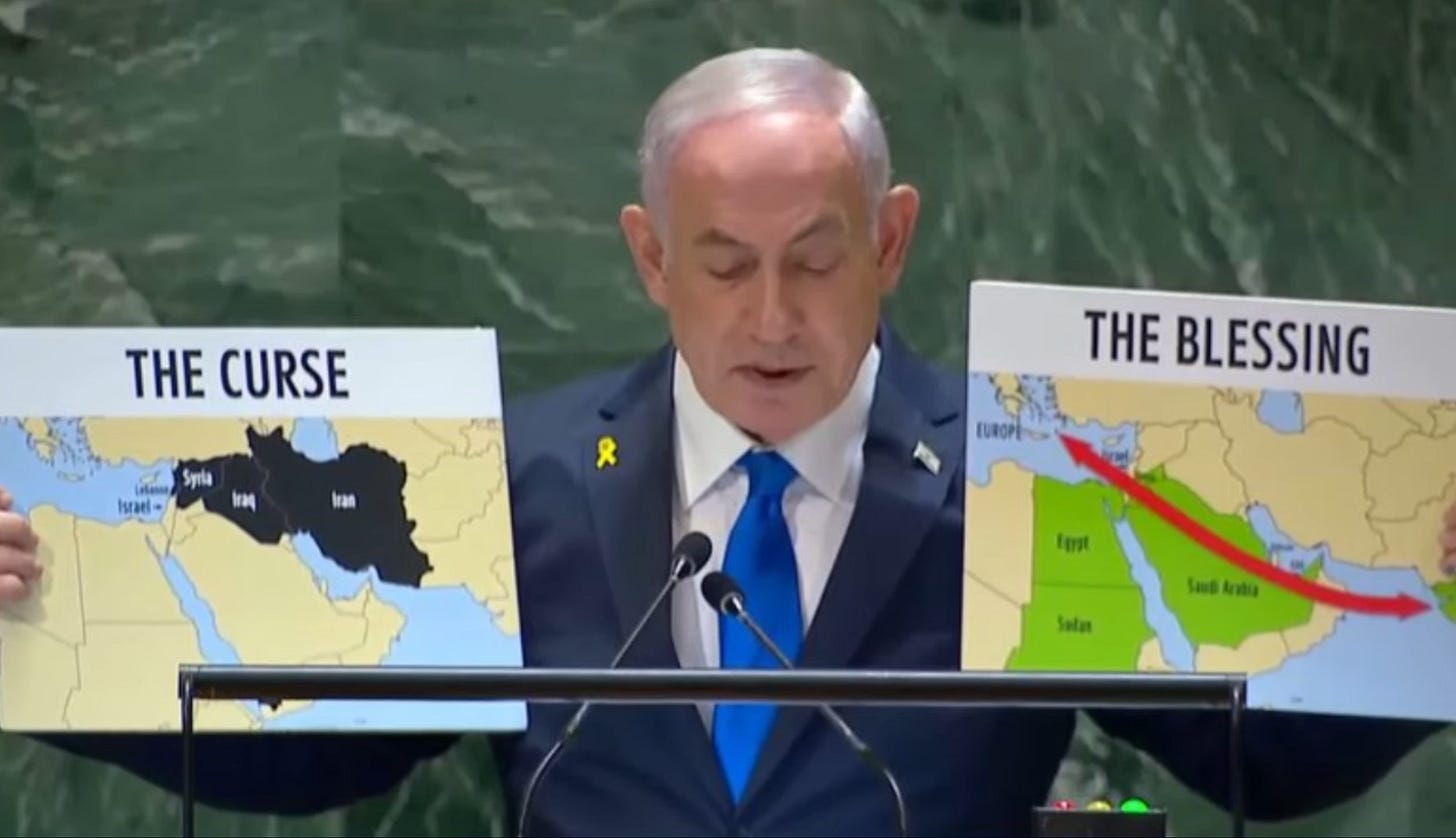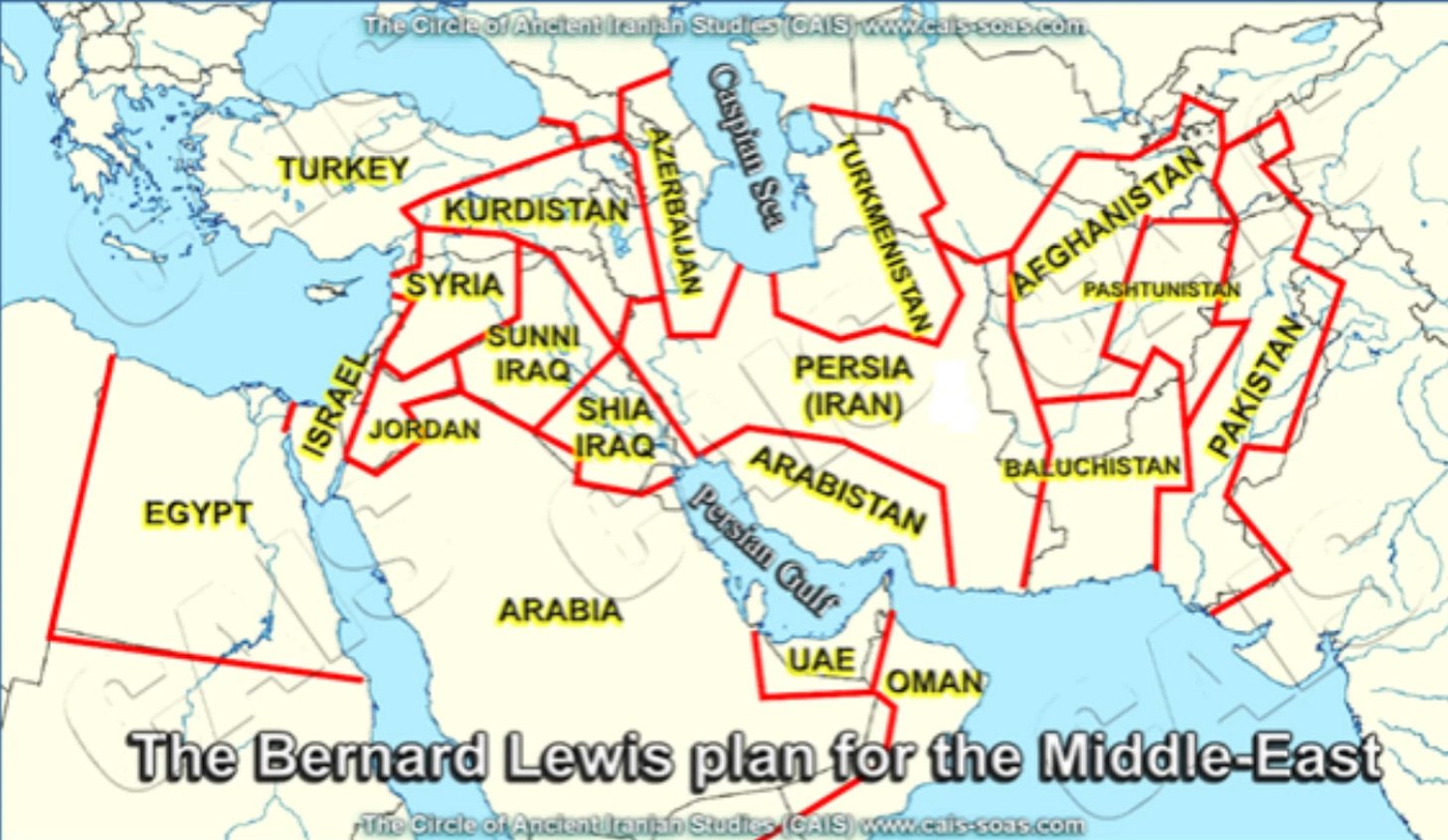Iran, China and America's Great Game
Part 2 of 3: Why is Iran so important to U.S. global strategy?
“The intelligence services of the United States, Britain, Israel and others are powerful enough to create chaos. They cannot win wars, but they can create chaos.”
—Hussein Askary
China has been kept in a box by Western sea power since the 1840s. The box is still there. The land road is China’s way out.
This is Part 2 of our look at the war to topple Iran. In Part 1 (here) we asked:
Who’s really in charge of all these wars, the U.S. or Israel? Which is the client state and which the master?
So many people have blamed the U.S. for “letting Netanyahu drag America by the nose” (as they would put it) into wars we have no interest in.
I would contend the opposite — that at best, America is partners with Israel, at worst we’re Israel’s master. I go with partners, of the back-scratching kind.
Partners, Each With a Goal
Of course, America and Israel have individual goals.
Israel wants the chaotic destruction of each non-controllable nation in its back yard — which stretches to Pakistan, by the way. Those it lets be are protected by their proved cooperation with Western hegemonic goals, meaning American goals. These nations include the wealthy Gulf kingdoms, home to U.S. bases, and India.
What are America’s goals? The destruction, ultimately, of Russia and China, the only challenges to its absolute superiority, its “full spectrum dominance,” if you will, of all the world.
Barack Obama wanted to pivot to Asia; isolating China was the reason he pushed so hard for the TPP trade deal. (Well, one of the reasons.) His focus on East Asia was the reason he wanted to disengage from the Middle East. It drove, in part, his desire to draw down in Afghanistan, and his willingness to work with Iran on a nuclear deal.
He was even less interested in confrontation with Russia than anyone after him (remember those days, when Russians in movies weren’t bad?). The press fought him tooth-and-nail about Iran and Afghanistan, and once Russiagate started, the Russiaphobe foreign professionals really weighed in.
Why Iran First?
This is not to criticize; just to describe. You can see the sides lining up among folks in the unelected U.S. establishment — those who think the road to Beijing should be marched on at once, versus those who think “Tehran first, then Moscow, then China; weakest to strong.”
It’s clear, isn’t it, that the Iran-first people have won. Why? There are two reasons:
Attacking Iran serves Israel’s needs well, and Israel is critical in keeping its neighbors in line. So call it a gift to a friend.
The Belt and Road Initiative — China’s plan to create land routes that bypass Western sea power, a modern Silk Road for goods and energy — runs right through Iran and the first station opened in May.
As we saw, Gen. Kurilla, CENTCOM commander, is an Iran-first guy who has “clashed with political appointees at the Pentagon who have sought to redirect the military’s attention to Asia.” And he won, which means the “Iran, then Russia, then China” team also has won, at least for now.
The Master Plan: Divide and Dominate
The best explanation of the master plan for Asia is laid out in the video below. I’ve included a full transcript — it’s an excellent read. The writer is a well-published scholar who works for the Belt and Road Initiative (BRIX) in Sweden. Take that for what it’s worth.
The meat of his argument is this (emphasis mine):
There's a new world economic order emerging out there, [and] because West Asia, Iran, the Gulf countries, Palestine, Syria are so crucial strategically and geographically, this region has become the battleground for the whole situation.
I believe that this is the true reason for the strategies, beyond Netanyahu, beyond Trump and the Zionists — the strategies at the level of people like Tony Blair and the London and Wall Street financial oligarchy, what people call the military-industrial complex. This is what they are thinking about. This is how important it is to defeat Iran.
The plan is to do a regime change in Iran as a key element in coming back to this “pivot of Eurasia,” and also to implement plans like the Bernard Lewis Plan to divide all these countries, but especially Iran, into ethnic entities. [See map below.]
Iran will be divided into four or five different [groups] — Persian, Azeri, Arab, Kurdish, Baloch groups. From there you move to Pakistan and Central Asia. There are plans to conquer and divide Russia [along] ethnic lines, carving Russia, splitting it into smaller pieces.
China is the big prize. China will be the final goal of this whole regime change process which started after 9/11.
Is it hard to imagine two generations of inbred neocons thinking like this? These are the magical thinkers who tried to create in Iraq a Western-style free market paradise. At it again.
The video is here:
A transcript appears below. My thanks to tweeter Apocalypseos for finding this piece. I’ve edited the text lightly for clarity. All errors are mine. Images below are from the presentation. I’ve added headings for ease of understanding.
Hussein Askary
Belt & Road Institute in Sweden (BRIX)
June 22, 2025
[Iran Has No Nuclear Weapons]
It is very clear that at least since 2003, Iran had no intention of producing a nuclear weapon. Its nuclear program is completely civilian. This has been proven not only by the International Atomic Energy Organization, but by the United States intelligence community itself. Since that time until now — until two weeks ago — the U.S. intelligence community’s opinion and assessment has been that Iran was not building a nuclear bomb.
This was expressed two weeks ago by the Director of National Intelligence of the United States in front of Congress, Tulsi Gabbard, and she said that Iran has no intention to build a nuclear bomb. This is the assessment, not of herself, but of all the American intelligence agencies. This goes back a very long time.
One way of assuring that Iran never acquires a nuclear weapon was through the JCPOA — the Joint Comprehensive Plan of Action — an agreement which was reached by Iran and the five plus one, the five Security Council members and Germany, in 2015. It took seven years to reach that agreement, and it assured that Iran, while it can keep its civilian nuclear program, will never be able to produce a nuclear weapon because there will be international observers inside every Iranian nuclear facility, assuring that Iran does not produce a nuclear weapon.
That agreement was cancelled by none other than President Donald Trump when he became president in 2016 [sic]. So, if there’s any problem, it's him to blame if Iran ever acquires a nuclear weapon — although his intelligence agencies are telling him Iran is not about to acquire a nuclear weapon. President Trump says that the American intelligence agencies don’t know what they’re talking about, which is a bit funny, in a way.
[Why Was Iran Attacked?]
So the issue here is: if Iran is not close to building a nuclear bomb, what are the real reasons for that?
The Israeli Prime Minister, Benjamin Netanyahu, has his own goals. The so-called Zionist movement has its own goals. Both the Israeli Zionists and the American Christian Zionists have their own goals, which are biblical prophecies and so on.
Netanyahu wants to make sure that the original plan handed over to him more than 20 years ago — called “A Clean Break” and “Securing the Realm” — [is followed] to make sure that there is no other power in the region, the so-called Middle East or West Asia, other than Israel.
There's a new world economic order emerging out there.
All other nations — major nations like Egypt, Syria, Iran, and so on — must be weakened and ruined — Iraq, of course, [as well] — so that Israel remains on top and is secure.
Ironically, that has not made Israel a secure country, as we can see today. But this level of thinking is not what the major strategists think about. These we call the Anglo-American elite, or the people who want to keep the unipolar world.
[The Unipolar World]
The unipolar world [idea] is that the United States and Britain will control the world, and their financial, economic, and military interests will be supreme above all other goals of other nations.
This is a utopian dream, but it’s a very dangerous dream because the United States is still the world’s largest military power, and it can wreak havoc around the world. The intelligence services of the United States, Britain, Israel and others are powerful enough to create chaos. They cannot win wars, but they can create chaos — as we saw in Iraq, Syria, Libya, Afghanistan and other places. There is no peace and security there. But the idea is to keep these areas in chaos so other powers don’t dominate. These other powers are, of course, Russia, China, and their allies in the Global South.
This is what is really behind the whole escalation. From the standpoint of the real big strategists in the United States, Britain, and some parts of Europe, [the aim] is to make sure there is no new world order — [no] multilateral world order — [but a world] where nations like China, India, Russia, and others in the Global South have no seat at the table of global governance; that there will be only the unipolar world deciding for other nations how to live, what level of economic and technological development is there for them. This is where the issue lies.
[Iran Is a Key Part of the Belt and Road Initiative]
Iran — this is what we want to discuss — has become a key element in the new world multilateral economic order. For many reasons, despite the 800 types of sanctions imposed on it for 40 years, Iran has managed to maintain a certain stable economic situation. It is building infrastructure, and integrating its infrastructure and economy with other nations in the Global South.
Iran is a key element of the [Chinese] Belt and Road Initiative. Many people are saying that the real goal of the attack on Iran is to destroy the Belt and Road Initiative.
But not only that — Iran is a key part of the Shanghai Cooperation Organization, which is a Eurasian security and also economic constellation. Iran [also] became a member of the BRICS nations, together with the United Arab Emirates, Egypt, Ethiopia, and now Indonesia. There are many other nations who are looking forward to becoming members of BRICS.
Iran has a pivotal geographical location on the Belt and Road Initiative and the Belt and Road Corridors, both the land-based corridor, which I will discuss now, and also the Maritime Silk Road.
[Other Reasons Iran Is Pivotal]
[Iran is also part of] what is considered an alternative to the Belt and Road by India [sic] — the Russia-Iran-India North-South International Transport Corridor, which goes from Russia through the Caspian Sea to the northern ports in Iran like Bandar Anzali. I was there myself as late as last May and saw the enormous advanced infrastructure being built there. [It also includes routes] on the eastern Caspian Sea to Bandar Abbas on the [Persian] Gulf, [and] also to Chabahar, close to the Pakistani border and further to India.
That’s why Iran has [not only] a geographical pivotal role, but also [an] economic role, in the whole constellation of what we call the Global South.
I have followed this development for many years. The first article I wrote was in 1996 for the American magazine Executive Intelligence Review, when President Hashemi Rafsanjani, the Iranian president at the time, inaugurated a small railway section between Mashhad in eastern Iran and Sarakhs in Turkmenistan, connecting that part of Asia to West Asia.
One year later, another railway was built from Tabriz in northwestern Iran to the border with Turkey. This was the first big Silk Road article I wrote, and it became part of the first-ever New Silk Road comprehensive report published by the Executive Intelligence Review and the Schiller Institute in 1997.
Iran is adjacent to nine countries in Central Asia. Pakistan. The China-Pakistan Economic Corridor. Turkey. Iraq. The Gulf. The Arabian Sea. The Indian Ocean. And so on. Iran has a pivotal role in all these constellations.
Iran also has a huge oil and natural gas reserve which it shares with Qatar, part of which was bombed recently by the Israelis. Iran, as a key component in the Gulf region and West Asia, is a very important part of this whole constellation.
One very interesting event which took place just about one week or more before the Israelis attacked Iran was that the first train between Xi’an in northwest China arrived at the IRP logistics hub in northern Iran. This will be a new line of transport on the New Silk Road — the Belt and Road — which is part of the China–Central Asia–West Asia corridor. ... This train, which arrived in Tehran, is symbolic. Many people say this could be a trigger for the Israeli attack. I don’t know if that’s true, but it is a symbolic aspect of that.
[China’s Increasing Role in the Region]
Important in this whole picture is that China has been playing an bigger and bigger role in this whole region. After the defeat of the United States and NATO in Afghanistan and their humiliating withdrawal in August 2021, you have what is called in British geopolitics “the pivot of Eurasia,” which is Afghanistan and Central Asia. This [the attempt to pivot] is getting out of the control of the British and the Americans for the first time in more than 200 years since the Great Game started.
Therefore, you have a vacuum [that] was filled by China. Actually, China has a very good relationship with the Taliban, and there are many investments in Afghanistan. Central Asian nations and Russia are also building constructive relations with Afghanistan. This whole center, this “pivot of Eurasia,” which the British wanted to keep unstable, is now out of their game plan, so to speak.
China also managed to get Iran and Saudi Arabia — who were entangled in a very dangerous and bloody proxy war in the region, the so-called Shia-Sunni divide — to normalize relations in March 2023. This ended nine years of really terrible destabilization of the whole region.
Because of the war in Syria, we had the problems in Lebanon and the war in Yemen, which the Saudis and the United Arab Emirates finally realized they can not win. Therefore the normalization between Saudi Arabia and Iran was very important.
A few weeks before that agreement in March 2023, President Xi Jinping was in Riyadh, Saudi Arabia, holding three major summits: one with the Saudi king and crown prince, one with the GCC (Gulf Cooperation Council), and one with all the Arab countries. This was a major breakthrough in relations, both diplomatically but also in terms of economic relations between China and the Arab countries.
A comprehensive strategic agreement was signed with Saudi Arabia. But President Xi Jinping offered a large number of cooperation areas — not only infrastructure, hard infrastructure — [but also] digital infrastructure, cloud computing, space technology, and nuclear technology. [In addition, China provided] clean technology and other things.
The Gulf countries want to diversify their economies now. They don't want to be reliant on the oil price, which keeps fluctuating, going up and down dramatically, putting them in dire economic and financial straits the whole time. Therefore, Saudi Arabia, the Arab Emirates, even Kuwait and other countries, want to industrialize. They want to use their sovereign wealth funds to invest in industries. But to have industries, you need to invest in infrastructure, which is transport, power, telecommunications, and so on. China is generous enough to offer all these things to the countries.
Two months later, in February 2023, Iranian President Ebrahim Raisi visited China and finalized a comprehensive strategic agreement with China for 25 years. This is one of the most comprehensive agreements ever signed between Iran and China.
Iran’s relationship is naturally with the West. Their relationship with Russia has been troublesome historically [and] also they didn't have much connection to Asia. But these agreements between the Arab countries and China, and Iran and China, and the normalization of relations between Iran and Saudi Arabia, [were] ushering a new era in the whole region’s political and economic situation.
[Western Alternative to the Belt and Road Initiative]
You remember in 2023, a few months after these developments, President Joe Biden announced from Indonesia during the G20 summit an agreement to build what is called the India–Middle East–EU corridor as a rival to the Belt and Road Initiative.
I wrote at that time that this is political fiction. It’s a political project. It's meant to undermine the Belt and Road, but without building any real alternative to the Belt and Road. [Under this plan] there will be no railways, there will be no ports, because all the railways and ports are already being built by China and these countries in cooperation with them. If you want to build something, you have to involve China. Therefore, I said this was a political fraud which is meant to derail the whole work China has been preparing with these countries.
[Netanyahu and the ‘New Middle East’]
In September, Benjamin Netanyahu spoke at the United Nations General Assembly and he presented a map of the region where in green you had Israel and some Arab countries that, according to him, were willing to normalize relations with Israel. Then the rest was outside. There was no map of Palestine, there was nothing about Palestine in that map, only Israel and the Arab countries. Iran, Iraq, Syria, and Lebanon were also left out of that picture.
A year later, he presented the same map, but now, after the genocidal war was launched in Gaza, he presented a new map including the India–Middle East–EU plan, and he called it “the blessing,” that this is the new blessing in the region, and the rest is "the curse," which includes Iran, Syria, Lebanon, and Iraq.
All these four countries, except for Iran, have been destroyed or are under the control of the Anglo-American elites and Israel. Iraq is controlled by the United States because all the oil export money is kept in the United States in the Federal Reserve, and the American president keeps that money under Executive Order 13303, which I have written a lot about and discussed in interviews.
Iran will be divided into four or five different groups — Persian, Azeri, Arab, Kurdish, Baloch groups. From there, you move to Pakistan and Central Asia. There are plans to conquer and divide Russia along ethnic lines, splitting it into smaller pieces. China is the big prize.
So the only one left in this “black curse” is Iran. Therefore, this whole issue is developing around trying to stop the Belt and Road Initiative, trying to stop the Shanghai Cooperation Organization — which many nations like Saudi Arabia, Egypt, and others want to join, even Turkey — and the developments around the BRICS nations and so on.
[Western Plan to Restructure the Middle East]
There's a new world economic order emerging out there, [and] because West Asia, Iran, the Gulf countries, Palestine, Syria are so crucial strategically and geographically, this region has become the battleground for the whole situation.
I believe that this is the true reason for the strategies, beyond Netanyahu, beyond Trump and the Zionists — the strategies at the level of people like Tony Blair and the London and Wall Street financial oligarchy, what people call the military-industrial complex. This is what they are thinking about. This is how important it is to defeat Iran.
The plan is to do a regime change in Iran as a key element in coming back to this “pivot of Eurasia,” and also to implement plans like the Bernard Lewis Plan to divide all these countries, but especially Iran, into ethnic entities.
Iran will be divided into four or five different [groups] — Persian, Azeri, Arab, Kurdish, Baloch groups. From there you move to Pakistan and Central Asia. There are plans to conquer and divide Russia [along] ethnic lines, carving Russia, splitting it into smaller pieces.
China is the big prize. China will be the final goal of this whole regime change process which started after 9/11.
Whether Russia and China will intervene to stop that, we don't know whether or not they are trying to use diplomatic ways, talking to Trump, talking to the Europeans to find a solution to this madness. But this is where things are going. Therefore people predict that the whole situation in the Middle East and Ukraine will develop into a global war — a global thermonuclear war.
This is the background which we believe is the reality behind the situation.












A variant of the MacKinder "heartland" theory of where the wrold's linchpin reaisdes. For MacKinder it incorporated what is now Ukraine and western Russia/belarus.
That Bernard Lewis map could easily backfire on the USA/Britain because there is no guarantee Kurds or Sunni/Shia Iraq would be western aligned. Russia might be happy with the plan because it weakens Turkiye and this opens the door to Russia to manipulate all these small states. And because Turkiye is a big loser, they might also turn against the west if they thought it was the USA/Britain that caused a Kurdish civil war.